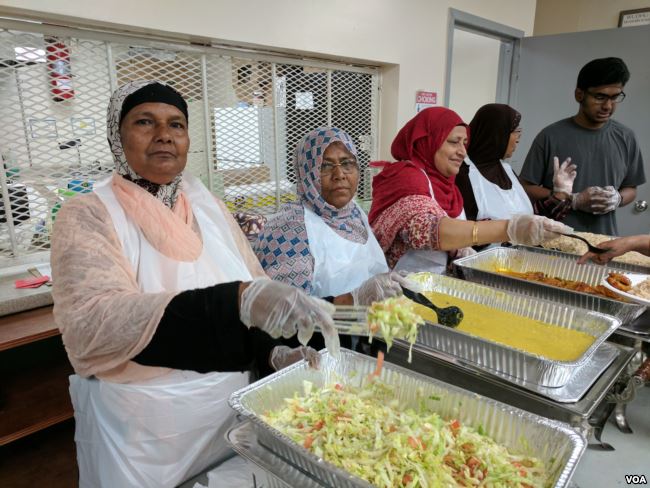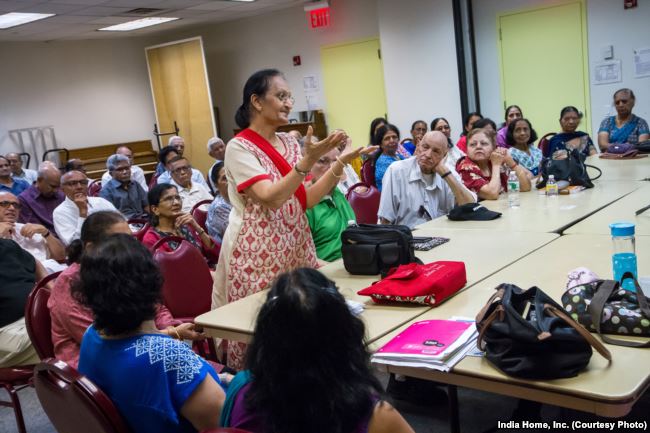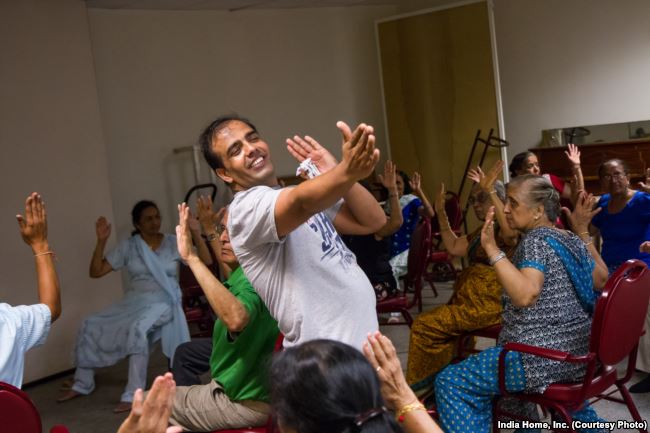by Ramón Cuauhtémoc Taylor. This article was originally published by Voice Of America News.
On a fluorescent-lit stage at Desi Senior Center, an instructor leads a group of mostly Muslim Bangladeshi immigrants, ages 60 and older, in a session of balance and core exercises.
Aided by PowerPoint slides, he instructs them to squat in Bengali, then proceeds to count to ten in English. The women, dressed in colorful dupattas and hijabs, stand on the right; men, wearing Tupi prayer caps, on the left. They place their hands on their hips. Some close their eyes.
For five hours a day, three days a week in the basement of Queens, New York’s Jamaica Muslim Center, more than 150 aging Bangladeshis exercise, eat, pray and socialize together — part of a custom-tailored senior program that they won’t find, and in many cases can’t afford, elsewhere in the city.
“We feel like we have to have our own religious place, and we also have to have our own food, which is Halal,” explains Dilafroz Nargis Ahmed, director of Desi Senior Center. “It is very much needed for our seniors to be somewhere where they feel [at] home.”
Among New York City residents over the age of 65, the immigrant population accounts for 49.5 percent, up from 38 percent in 2000, and growing. Facing language and cultural barriers, increased isolation, and higher levels of poverty than their native-born counterparts, the rapid expansion has taken its toll on both immigrants and the small, cash-strapped organizations that serve them.
“Because the needs are now so much more diverse, along with the diversity of the population, we really need to rethink how it is that we serve seniors across the city in new ways,” says Christian González-Rivera, senior researcher at Center for an Urban Future.

Desi Senior Center provides Halal and vegetarian options for its mostly-Muslim Bangladeshi community. (R. Taylor/VOA)
Financial and language barriers
Jahan Ara Amin from Dhaka is among the many Bangladeshis at Desi Senior Center who have struggled culturally, linguistically and financially.
When she and her husband first came to the United States in 2016 on a family-based immigrant visa, she felt unwelcomed by the in-laws at her daughter’s home in Texas — a situation that Ahmed, the center’s director, explains is common among the Bangladeshi diaspora.
Speaking through a translator, Amin breaks down as she describes her dilemma. Ultimately, she and her husband chose to settle in New York due to the large contingent of Muslim-faith Bangladeshis, but have yet to find affordable permanent housing. Lacking skills in English and how to navigate public transportation, she worries how she “will go outside the next day.”
“When I am home, I feel tension and anxiety,” she says. “But when I come here, I forget everything.”
Recent arrivals such as Amin are among the 31 percent of older immigrants who lack Social Security and other federal benefits. At Desi Senior Center, she receives a warm Halal meal of brown rice, fish, daal and shemai for dessert. Otherwise, she is mostly on her own.
Anand Ahuja, an Indian-American immigrant and an attorney at law, says situations like Amin’s still prove an “unnecessary burden” on local resources.
“If your own country members cannot take care of you, that should not be a license for you to be dependent upon the state,” Ahuja tells VOA. “If you have problem of religion, if you have a problem with language … isn’t it better for you then to go back to your home country?”
Earlier this year, U.S. Senator Tom Cotton introduced an immigration bill that includes a visa provision for parents of citizens “in need of caretaking.” In exchange, parents would not be able to work or access public benefits, and “must be guaranteed support and health insurance by their sponsoring children.” Cotton plans to reintroduce the bill with changes later this summer.
But Lakshman Kalasapudi, deputy director of India Home, says there is a misconception that South Asian immigrants who arrive as older adults are “fully taken care of” when they live with their children.
“This financial dependency kind of creates family tensions, especially when the seniors are living in overcrowded situations,” Kalasapudi says. “There becomes a real breakdown in the family structure and it really profoundly negatively affects the seniors’ mental health.”
India Home is a secular organization that depends heavily on community donations and discretionary funding from local council members. It confronts social isolation and loneliness among South Asian elders. But it does so by partnering with existing centers, including Jamaica Muslim Center.

Usha Shah, 73, participates in a Father’s Day discussion at India Home.
‘Not mixing with anybody’
According to Kalasapudi, social isolation among immigrants — India Home’s primary concern — is common across class backgrounds.
Subhash Bhasin, 78, and Prabha Bhasin, 74, who immigrated from India nearly 40 years ago on L1 and L2 visas and became citizens, receive Social Security and Medicare benefits. But they too experienced loneliness and depression upon becoming seniors.
“We went back [to India] and we tried three years, but we could not settle so we came again,” said Prabha.
When they returned, they found a community in India Home.
“We say our prayers … we sing bhajans,” says Prabha. “We feel like we have an extended family now.”

India Home seniors participate in an exercise class.
Seated in a packed corner room at Queens Community House Kew Gardens, another India Home partner, the Bhasins participate in a Hindu Philosophy course. Across the hall, the Shahs play rummy.
“Before [India Home], I was not talking very much, not mixing with anybody,” says Bharat Shah, a retired JFK airport parking cashier.
But 25 years later, he boasts of his confidence and social endurance.
“All seven days, I keep busy from 8:30 to 5:30,” he says. “After 5:30, I go out for two hours with my friends.”
Usha, who volunteers and attends activities at every India Home location, keeps just as busy as her husband. But in the spare moments when she is alone, she has found happiness there too.
“I play Candy Crush also,” she says, smiling.
The opinions expressed in this article are those of the author and do not necessarily reflect those of the Diverse Elders Coalition.

